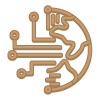The advancement of technology has had a significant impact on our daily life. These technological advancements are not new to the healthcare industry. Increasingly widespread are technologies like artificial intelligence, cloud computing, and even “smart” devices. Studies in the medical industry have demonstrated that technological advancements have increased patient safety. As a result, it should be no surprise that the healthcare industry is becoming increasingly reliant on technology.
Consider all that medical software can now perform as a result of technological innovation. Even in the case of the Covid-19, a vaccine would not have been available in such a short period without the assistance of technology. Every day, new opportunities emerge due to the continuous evolution of healthcare software solutions. Custom medical software development is another fascinating alternative currently available in the healthcare industry!
A few ways medical software applications have benefited healthcare will be discussed in further detail in the subsequent article:
1. Keeping Electronic Health Records up to Date (EHR)
Before introducing electronic patient information and treatment records, patient information and treatment records were entered manually on paper-based systems. This procedure was time-consuming, prone to errors, and difficult to discuss with others.
Doctors working in different parts of the country could not communicate with one another about their concerns easily. However, implementing electronic health record (EHR) systems in the late 2000s has fundamentally altered how a healthcare facility operates.
Everything is now done digitally, and all of the information is saved in cloud-based storage systems. As a result, staff members and doctors will be able to access and manage this information at the touch of a button. As a result, patients receive better care because all pertinent information is immediately available. Everything can be handled electronically today, from patient information to evidence of care and billing choices. This medical software system has been hailed as one of the most innovative developments in the history of medicine.
2. Providing Health Services to Patients Using Medical Software
In telehealth, medical professionals and patients communicate with one another via technological means. As a result of the epidemic, this has grown significantly more common in recent years. The availability of telehealth services eliminates the need for patients to visit a hospital for routine checkups. Doctors can communicate with patients and watch their progress without leaving the hospital using this technology.
This healthcare software system has altered how people approach medical procedures. Patients who cannot move now have a much simpler time talking with their careers because it may be done remotely. It is also possible for multiple doctors to participate in a single patient call to promote collaboration. This has already resulted in numerous benefits, the most significant of which is eliminating the need for patients to spend hours waiting for an appointment. It has also had the added benefit of lowering costs for healthcare facilities.
3. Artificial Intelligence (AI) is Becoming Increasingly Popular
Artificial intelligence aims to imitate human intelligence at a far higher level of efficiency. Consider how much can be changed if artificial intelligence is completely integrated into the healthcare system. When it comes to processing large amounts of data, it will be able to derive valuable information from them. For example, searching through ancient medical records to identify a certain patient is a good illustration. Alternatively, you may create a new medicine based on the skeleton of an existing one.
It takes several simulations to develop a vaccine against viruses, even when it comes to bacteria. What if artificial intelligence (AI) was able to execute this automatically and at far higher speeds and efficiency? The results will be obtained significantly more quickly, resulting in a significant reduction in human deaths.
Artificial intelligence is currently being applied on a much lesser scale in the healthcare industry. However, this is because we are still investigating and developing these software methods. As time goes on, the potential of artificial intelligence becomes increasingly appealing.
4. Scheduling Appointments and Invoice Generation in Medical Software
Healthcare software packages are available that help lessens the administrative staff’s workload. Patients would be able to schedule appointments online and without any fuss if they use this technology. There is no need to visit a hospital or phone ahead to schedule an appointment in most cases. All records are maintained and managed digitally, eliminating the need for staff to interfere and add notes.
The billing process may be automated and digitized on the same platform, which is a significant benefit. Patients can make payments through online services, thereby significantly lowering the time and effort required to complete the transaction. Video conferencing, similar to health, might also be included in the same software, resulting in a comprehensive medical package.


